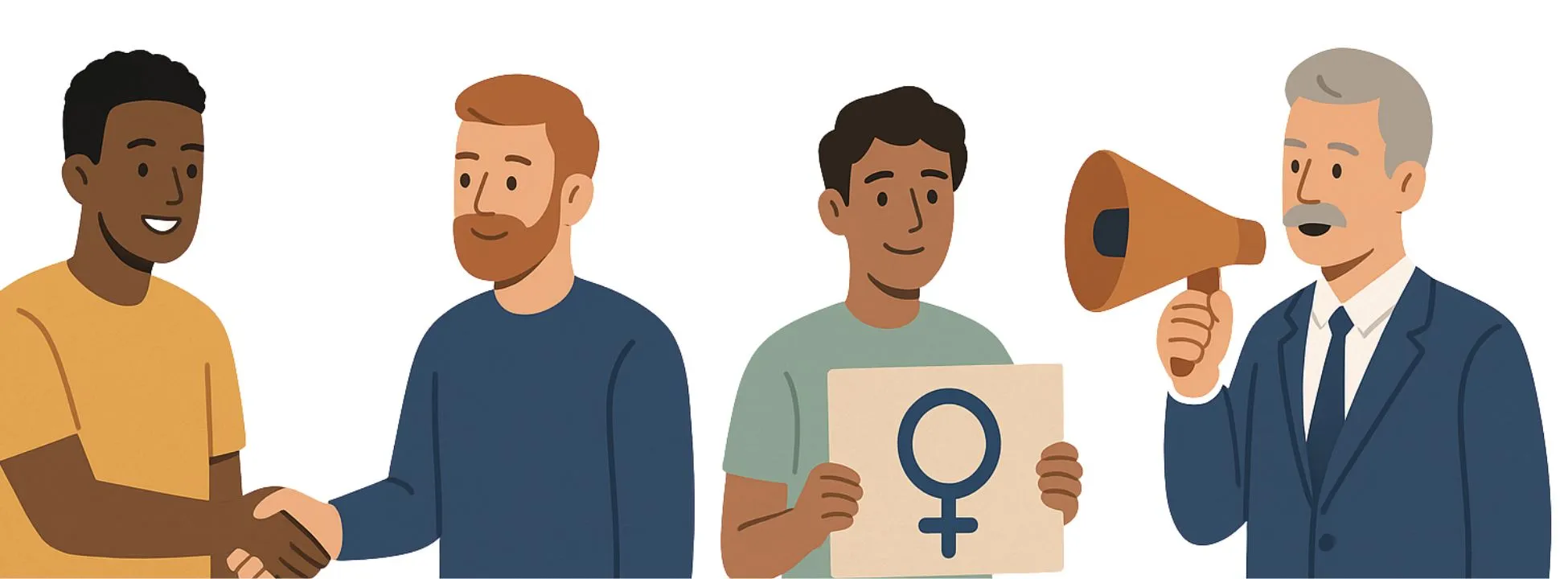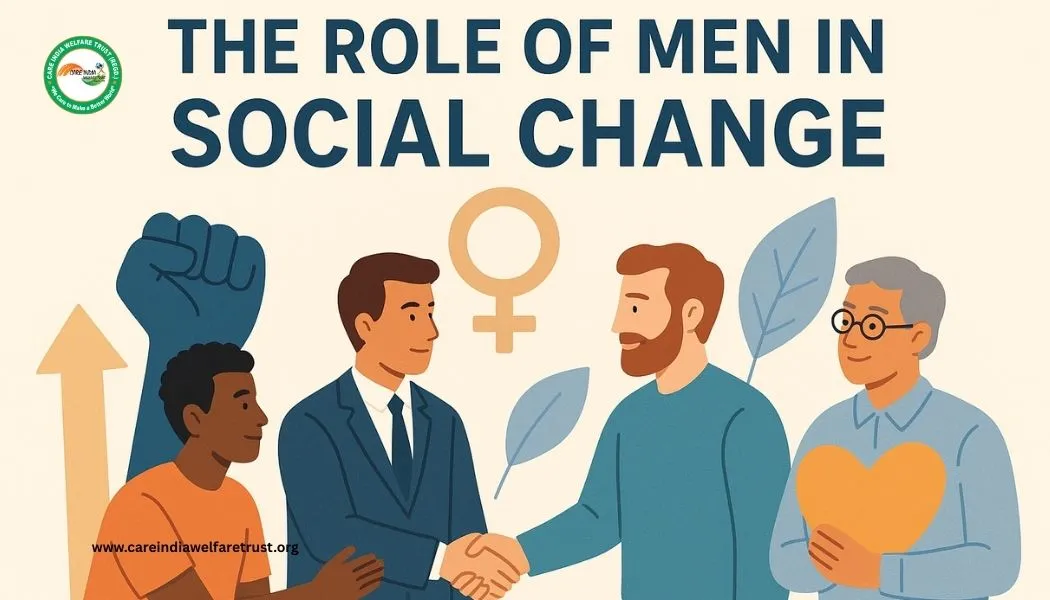Role of Men in Society
The role of men in society has changed greatly over time. In the past, men were often seen only as providers and protectors. They were expected to earn money, make decisions, and take on leadership roles, while women handled family and household duties. But in today’s world, these roles are no longer fixed. Men are now part of every aspect of life at home, in workplaces, and in communities. They are fathers who care for their children, partners who share responsibilities, and leaders who guide with fairness and respect.
One of the most important roles men play today is in building equality. By supporting women, respecting diversity, and challenging unfair traditions, men help create a society that is more balanced and just. Men are also role models for younger generations. When boys see men showing kindness, sharing household work, and respecting others, they learn to follow the same path.
In addition, men contribute to society by using their skills, creativity, and leadership to solve problems, support communities, and drive positive change. Whether it is through education, social work, or advocacy, men have the power to shape a better future. The importance of men role in social change cannot be ignored, as their active participation helps break harmful traditions, promote equality, and inspire collective progress.
The modern role of men is no longer about control or dominance it is about partnership, care, and responsibility. Society grows stronger when men step into these roles with compassion and respect. Today, being a man means contributing equally, supporting fairness, and working together for the well-being of all.
Men as Allies in Gender Equality
Gender equality is not only a women’s issue—it is everyone’s issue. When women are given equal opportunities, the whole society benefits. Men play a very important role in making this happen. As allies, men can support women by respecting their voices, standing against unfair practices, and challenging discrimination when they see it. At the same time, we must also recognize gender inequality in men, because unfair expectations and stereotypes can also harm them. True gender equality for men means allowing them the freedom to express emotions, share responsibilities, and live without pressure from rigid roles. For example, in the workplace, men can support women’s leadership, promote equal pay, and ensure that both genders share responsibilities fairly. Organizations like Care India Welfare Trust also work to raise awareness and encourage equal opportunities for everyone.
Addressing both women’s struggles and gender inequality men face creates a society where equality is balanced and fair for all. At home, men can show equality by sharing household tasks and childcare. Being an ally does not mean taking control of women’s struggles. It means standing beside them and working together to achieve fairness. When men and women join forces, equality becomes stronger and real change happens faster. Men who become allies also set a good example for the next generation. Boys who see their fathers, brothers, or teachers respecting women will learn to do the same. This collective effort, supported by initiatives like Care India Welfare Trust, builds a more just and fair society where everyone has the same rights and opportunities.
The Importance of Emotional Intelligence in Modern Manhood
In today’s world, being a man is not just about physical strength—it is also about emotional intelligence. Emotional intelligence means understanding your own feelings and recognizing the feelings of others. It is about listening with care, showing empathy, and responding in thoughtful ways. For a long time, strict gender roles told men to hide emotions and “be tough.” This created many problems, such as stress, anger, and broken relationships, which are often seen in male gender inequality examples where men are denied the freedom to express themselves.
Now, more men are realizing that expressing emotions does not make them weak—it makes them human. A man who listens to his partner, comforts his child, or supports a friend emotionally is showing true strength. The modern role of men includes understanding and supporting others emotionally. Emotional intelligence also helps in the workplace, where teamwork, communication, and understanding are very important. Men who develop this skill build stronger families, healthier friendships, and better communities. By embracing emotional intelligence, modern men can create a society where care, respect, and understanding are valued just as much as physical or financial success, challenging old ideas of what men “should” be.
Fathers, Brothers, and Leaders: Redefining Family and Community Roles
The traditional role of men in the family was often limited to being the “provider.” Men were expected to earn money, while women took care of the home and children. But this idea is changing. Today, men are stepping into more equal roles within families and communities. Fathers are not just providers; they are also nurturers. They change diapers, cook meals, attend school meetings, and share daily responsibilities with their partners. Brothers, too, are learning to support their sisters’ dreams instead of limiting them with old ideas of what girls “should” or “should not” do.
As community leaders, men are guiding with kindness, respect, and inclusion rather than control. By embracing these roles, men help build families that are stronger and more balanced. Children growing up in such families see both parents sharing responsibilities and learn the value of fairness and cooperation. In the larger community, men who lead with compassion create healthier and more united societies. This redefinition of roles shows that true leadership is not about control, but about working together for the well-being of all.
Challenging Toxic Masculinity for a Healthier Society
“Toxic masculinity” is a harmful idea that tells men they must always be dominant, unemotional, and aggressive. It encourages men to hide their feelings, avoid vulnerability, and prove their worth through power and control. This often hurts both men and women. For example, men who cannot express emotions may struggle with stress and mental health problems. Women, on the other hand, may face discrimination or violence from men who feel they must dominate.
Challenging toxic masculinity means teaching boys and men that it is okay to be vulnerable, to show emotions, and to respect others. It means replacing control with cooperation and aggression with kindness. Men who reject toxic masculinity live healthier and happier lives because they are free to be themselves. They form better relationships, support equality, and contribute to peaceful communities. A society where men are not trapped by these harmful ideas is a society where everyone benefits. It creates space for men to be caring fathers, respectful partners, and compassionate leaders.
How Men Can Move Workplace Diversity and Inclusion
Workplaces are stronger when they are diverse and inclusive. Men can play an important role in making this happen. For a long time, many workplaces were male-dominated, with fewer women or minorities in leadership roles. But things are changing. Men who support diversity can ensure equal opportunities by encouraging women and underrepresented groups to take leadership positions, respecting their ideas, and standing against unfair treatment.
For example, a male manager can mentor female employees, make sure they are heard in meetings, and push for equal pay. Men can also create policies that support work-life balance, such as flexible hours and parental leave for both mothers and fathers. Inclusive workplaces are more creative because they bring together different perspectives and experiences. They are also fairer and more successful, as employees feel valued and motivated. By driving diversity and inclusion, men not only make their organizations better but also help build a society that respects and values everyone equally.
Men in Advocacy: Leading Movements for Social Justice
Across the world, men are stepping up to fight for fairness and justice. They are joining or even leading movements that support gender equality, climate change action, human rights, and social reforms. When men use their voices and influence to stand for justice, they inspire others to do the same. Advocacy means speaking out against what is wrong and working to make things right. For example, male leaders have stood with women in movements against violence, supported equal education for girls, or campaigned for cleaner environments.
Men in advocacy are powerful because they show that social issues are not limited to one group—they affect everyone. By standing up for fairness, men encourage more people, especially other men, to get involved. This collective action brings real and lasting change. Advocacy is not about power; it is about responsibility. When men use their voices for good, they help create a society where justice, equality, and peace can grow.
Education and Awareness: Shaping the Next Generation of Men
Change begins with learning. The values we teach young boys today will shape the men they become tomorrow. If boys grow up being taught respect, kindness, and equality, they will become responsible men who value fairness. Families, schools, and communities all play an important role in this process. For example, teaching boys to share household work, respect women, and express emotions prepares them for balanced and healthy relationships in the future.
Education should also highlight the dangers of toxic masculinity and the benefits of empathy and cooperation. Awareness programs in schools can encourage boys to respect diversity, care for the environment, and stand against injustice. By shaping the mindset of young men, society builds a future where equality and fairness are natural, not forced. Teaching boys that true strength comes from compassion, not dominance, creates a new generation of men who will continue driving positive social change.
From Power to Partnership: Building Balanced Relationships
Healthy relationships are built on balance, not control. For a long time, many relationships placed men in a position of power, while women carried most of the responsibilities at home. But today, men are learning that true partnership means sharing responsibilities, listening with care, and supporting each other. A man who cooks dinner, helps with children, or supports his partner’s career is not losing power—he is building a stronger relationship. Partnership is about trust, respect, and teamwork. When both partners share roles equally, families become happier and more stable.
Balanced relationships also teach children important values of fairness and cooperation. Boys who see their fathers treating their mothers with respect are more likely to do the same in the future. Partnerships based on equality also reduce stress, as no one feels overburdened. By moving from power to partnership, men are helping to build families and societies that value love, respect, and balance.
The Future of Masculinity in a Changing World
Masculinity is no longer about fitting into a rigid box. In the past, society expected men to behave in one narrow way—strong, dominant, and unemotional. But the future looks very different. Men today are more open, supportive, and respectful. The future of masculinity is about freedom—the freedom for men to define themselves in their own way. It is about being a caring father, a supportive partner, a fair leader, and a compassionate human being.
As society evolves, men will continue to play a vital role in creating fairness and peace. They will stand beside women in the fight for equality, challenge harmful traditions, and lead with empathy. The changing world needs men who are not afraid to express emotions, admit mistakes, or support others. This new idea of masculinity is not about losing strength, but about gaining humanity. In the future, masculinity will mean responsibility, respect, and the courage to build a better world for all.
FAQ
What are 10 roles Played By Males in Society?
Men play many roles in society: father, husband, brother, leader, teacher, friend, mentor, provider, community helper, and advocate for equality, fairness, and positive social change.
What Roles Do Women Play in Society?
Women play many roles in society: mother, daughter, sister, partner, teacher, leader, worker, caregiver, mentor, and advocate, contributing to families, communities, and workplaces, and promoting equality and positive change.


